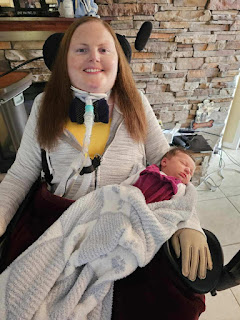I have explained before about muscle spasms being a part of
having a spinal cord injury. I have asked a few questions to my doctors if I
should increase my baclofen pump (up the dosage) because of increased
spasticity.
A specialist in physical medicine and rehabilitation along
with spinal cord injury medicine working at Sister Kenny who helps loosen my
neck explained some reasons to and not to increase it. Also, why I may be more
spastic now.
Increase-if the spasms hurt, they make it hard to sleep or interfere with daily activities.
Some reasons why I may be more spastic right now are:
weather changes, Botox needed in my neck, health issues, get worse after a
while (increase then muscles get used to the dose then the process starts all
over again) etc.
Not to-one thing she explained is that despite muscle spasms
being hard to control or a nuisance, they are good for keeping muscle tone or
muscle activity (maintaining muscle circulatory function, compensates for
muscle weakness, keeping bone density etc.
She also said to spend a little extra time working through
each spasm (if my arms spasms straight, work on bending to release the spasm.)
This will make it easier to get things done, even though it may take up more
time than usual. Although I usually only spasm when somebody is moving one of
my limbs, like range of motion, stretching me, getting me dressed, etc. Never
just by myself, which happens to many people with spinal cord injuries.
The biggest problem that I have other than muscle spasms is
pain, the worst being my neck (specifically my right side.) I’ve talked before
about using Botox in my neck to help loosen my muscles. Although it only helps
for about a week and then tightens up again. She also works on relaxing muscles
in my neck, which is the main reason why I see that specific doctor. Also, my
right arm is dropping out of its socket, which causes difficulty with range of
motion and pain.
June 15 my spasms were intense making it difficult to do
anything including range of motion, sleep, sitting in my wheelchair, etc. Also,
when I was eating dinner on that Saturday night, I wasn’t feeling good. When my
night shift nurse came on, she could tell something was off with me, so she
took my blood pressure. It was 200/130, which could be a sign of autonomic
dysreflexia (AD-something people with spinal cord injuries get when there is
pressure somewhere, could be a wrinkle, needing to be cathed, bowels, etc.) or
an infection someplace.
Even for me, it’s too high to handle no matter what it’s
from, so she called 911 and off to the ER I went. Just another ambulance ride
to add to my list. Along with my blood pressure being high, I had a fever and
other issues acting like there was something wrong in my body (my nurses and I noticed
something was off within a couple weeks before I went in.) I spent 5 days in
the hospital, while they scanned my body head to toe looking for answers.
I had an MRI of my brain, CT scan of my head and another for
my chest, abdomen, and pelvis. Also, they took blood, sputum and urine cultures
along with multiple other tests. All of them came back to be negative, which
was a mystery to me and my doctors. I was on 2 different IV antibiotics, which
helped with any infection in my body go away even though they couldn’t find a
source. This was the 5th time since October that I’ve been in the
hospital due to some sort of infection.
My body and I have had a rough year! Hopefully there are no
more bumps in the road, but I can’t say that for sure. The past couple of days I
have been experiencing AD, high blood pressure, more spasms etc. I haven’t
found a reason “why” yet. Although I don’t like every entry to be about me
being sick or in the hospital.
I’m looking forward to a beautiful summer. Except we’ve already had some high temperatures, including the weekend when I got home from the hospital, where the temperature was 93°F with a heat index of 110°F! Yes, I stayed inside; my body takes on the temperature surrounding me since it has a hard time regulating temperature (part of a spinal cord injury.)
Jenni



